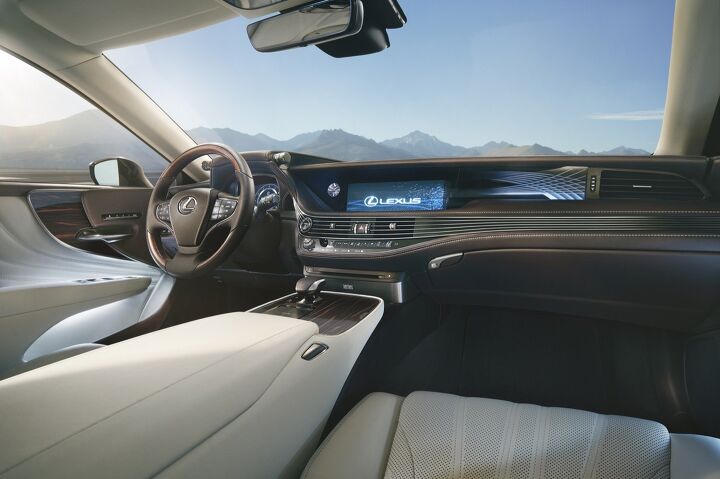Toyota Expects Lexus LS Sedan Sales to Take Off Again, but Not Nearly to Historic Levels
Timing is tough.
Toyota’s Lexus luxury marque launched the fourth-generation Lexus LS for the 2007 model year, just prior to an economic collapse that was followed up by an anti-car/pro-SUV shift. Lexus, which averaged more than 25,000 annual U.S. sales of its LS flagship sedan during its third generation and then topped 35,000 sales in 2007, suddenly found itself struggling to top the 10K marker.
As the fourth-gen LS’s tenure came to an end, Lexus watched as demand for the LS quickly collapsed. From fewer than 11,000 sales in 2013 and fewer than 9,000 in 2014 to barely more than 7,000 in 2015 and only 5,514 in 2016, the once hugely successful Lexus LS — a former leader of America’s large luxury sedan class and the car that was responsible for the genesis of Lexus — became an afterthought.
The fifth-generation Lexus LS is set to go on sale this winter, and Lexus expects to see a huge increase in demand for the new car in 2018. Lexus does not, however, expect the LS to generate anything like the kind of interest the big sedan did prior to the proverbial global financial crisis.
According to Automotive News, which says the 2018 Lexus LS500 will be priced around $76,000 (up by roughly $2,500 compared with the MY2017 LS), Lexus anticipates U.S. sales of roughly 1,000 per month with the new model.
Over the last year, Lexus has averaged around 500 LS sales per month.
Doubling volume would be an impressive accomplishment, though that would only take the Lexus LS back to approximately 12,000 annual sales, hardly the 27,400-unit annual average Lexus produced in the half-decade before the recession. Times, of course, have changed. BMW sold 17,500 copies of the 7 Series per year between 2003-2007 but now averages 10,800 per year. The Mercedes-Benz S-Class averaged 23,300 annual U.S. sales between 2003-2007 but now averages 18,200 per year. Jaguar used to sell 7,700 XJs per year but now sells 4,400 annually.
It’s a segment-wide curse, in other words, one that’s been followed by an industry-wide blessing. These brands all sell boatloads of SUVs/crossovers now, vehicles that have effectively replaced large luxury sedans in many driveways.
So how will Lexus deliver on its forecast? “We do expect to attract people from different brands who may have drifted away,” says Lexus’ marketing general manager, seemingly acknowledging that the outgoing Lexus LS didn’t do enough to keep buyers in the fold. The new LS adopts a longer, lower, wider appearance that emphasizes its non-SUV bodystyle, and Lexus says the brand has taken on a more performance-oriented tone, not wanting the LS to be seen merely as the sedate and cautious choice.
This isn’t the first time Lexus has been forthright with its sales expectations for a new car. The Lexus LC, with which the LS shares its turbocharged V6 and ten-speed automatic, was intended to attract 400 U.S. buyers per month. But after doing so in its first two months on the market, LC sales slid to 313 in July and 291 in August, its fourth month of availability. On the other hand, Lexus was ready to sell 2,200 copies of the entry-level NX crossover per month and ended up more than doubling that figure.
[Image: Toyota Motor Corp.]
Timothy Cain is a contributing analyst at The Truth About Cars and Autofocus.ca and the founder and former editor of GoodCarBadCar.net. Follow on Twitter @timcaincars and Instagram.
More by Timothy Cain
Latest Car Reviews
Read moreLatest Product Reviews
Read moreRecent Comments
- Jkross22 When I think about products that I buy that are of the highest quality or are of great value, I have no idea if they are made as a whole or in parts by unionized employees. As a customer, that's really all I care about. When I think about services I receive from unionized and non-unionized employees, it varies from C- to F levels of service. Will unionizing make the cars better or worse?
- Namesakeone I think it's the age old conundrum: Every company (or industry) wants every other one to pay its workers well; well-paid workers make great customers. But nobody wants to pay their own workers well; that would eat into profits. So instead of what Henry Ford (the first) did over a century ago, we will have a lot of companies copying Nike in the 1980s: third-world employees (with a few highly-paid celebrity athlete endorsers) selling overpriced products to upper-middle-class Americans (with a few urban street youths willing to literally kill for that product), until there are no more upper-middle-class Americans left.
- ToolGuy I was challenged by Tim's incisive opinion, but thankfully Jeff's multiple vanilla truisms have set me straight. Or something. 😉
- ChristianWimmer The body kit modifications ruined it for me.
- ToolGuy "I have my stance -- I won't prejudice the commentariat by sharing it."• Like Tim, I have my opinion and it is perfect and above reproach (as long as I keep it to myself). I would hate to share it with the world and risk having someone critique it. LOL.



































Comments
Join the conversation
The LC500 and LS500 do not share the same engine. The LC uses the 5.0 V8 while the LS has exclusive rights to the new turbo V6... for now.
As multiple LS owner, I'm disappointed there's no V8 in the new car. Because I prefer a V8 in a top shelf luxury car and because Lexus makes some of the finest V8s available. What a shame...